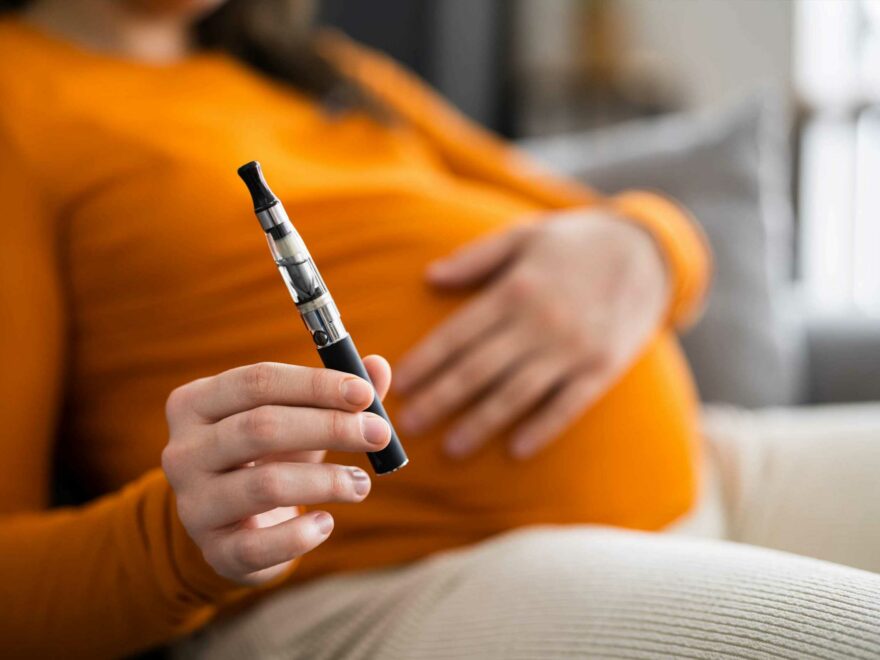PREGNANT women have been warned over the dangers of vaping after one woman suffered a horrific lung bleed.
The 28-year-old, who vaped on a regular basis, nearly lost her baby and had to be rushed to hospital for an emergency C-section, medics said.

Experts at the Texas Tech University Health Sciences Center in Amarillo, Texas, said the 'otherwise healthy' woman had been severely oxygen deficient and had a rapid heartbeat.
Writing in The American Journal of Medical Sciences, medics said the woman had severe hemorrhaging in her lungs.
This may have been caused by consistent damage to the blood vessels that carry oxygenated blood to and from the heart, they said.
The patient was initially given antibiotics to try and treat the condition.
read more on vaping

I never smoked before I vaped – now I’ve been left with incurable ‘popcorn lung’

I got hooked on vapes and ended up coughing up blood – don’t make my mistake
However, these failed to work and her condition continued to get worse – forcing doctors to perform a C-section to save her unborn baby's life.
The patient's husband said his wife had been vaping on a regular basis and had been experiencing symptoms such as shortness of breath.
Vaping and the use of e-cigarettes has been widespread globally.
It's become popular in those trying to quit smoking, with a variety of liquid flavours available.
Most read in Health

The 7 simple lifestyle tweaks that slash your risk of killer dementia

Are you TATT? The 5 types of tiredness and how to combat them

I have to fly to Turkey for £80K op as NHS 'left me to die' – I’ve got months left

Warning as energy drinks 'increase your risk of heart attack and stroke'
In 2015, Public Health England released a report which found that e-cigarettes were around 95 per cent less harmful than tobacco and the NHS recommends smokers try vapes in order to kick the habit.
But the medics in Texas said there has been 'limited' studies published on the products since they were first released in 2007.
"The use of vaping has overtaken the standard electronic cigarettes in our current time and it has been a challenge to understand the health risks that they have due to the rapidly changing designs and lack of long-term follow-up," they added.
Official guidance from the NHS states that 'if using an -cigarette helps you to stop smoking, it is much safer for you and your baby than continuing to smoke'.
Medics add that e-cigarettes do not produce tar or carbon monoxide, the two main toxins in cigarette smoke.
"Carbon monoxide is particularly harmful to developing babies. The vapour from an e-cigarette does contain some of the potentially harmful chemicals found in cigarette smoke, but at much lower levels," NHS guidance states.
The case in Texas comes after a man in Indiana, US, who had become 'hooked on vapes' – was left coughing up blood in a battle with pneumonia.
Dustin Fitzgerald, 45, from Clinton, Indiana, US, said doctors diagnosed him with bacterial pneumonia caused by moisture trapped in his lungs from the e-cigarettes.
Just last month, a study by Canadian researchers found that popular vapes damage your lungs in the same way as cigarettes do.
Medics found exposure to vapour from Juul e-cigarettes alter the cells in lungs.
While the worst effects were found in prolonged exposure, even low levels had significant impacts, the team said.
Dr Carolyn Baglole, of McGill University in Montreal, Quebec, said the study suggests vaping could lead to lung damage in the long-term.
One woman also told how she had been left with 'incurable popcorn lung' after becoming 'attached' to her vape.
A separate study published in 2022 found that the devices could cause deadly effects on the heart and blood vessels.
Research, published in Arteriosclerosis, Thrombosis, and Vascular Biology journal found that vaping causes as much damage to the blood vessels as smoking tobacco.
Read More on The Sun

Major supermarket makes huge change to meal deal – but shoppers will be divided

B&M launches massive 75% off everything in closing down sale
When blood vessels become damaged, it becomes harder for oxygen to flow around the body and for the cardiovascular system to function properly.
This can lead to deadly conditions like stroke and heart disease.
Source: Read Full Article
